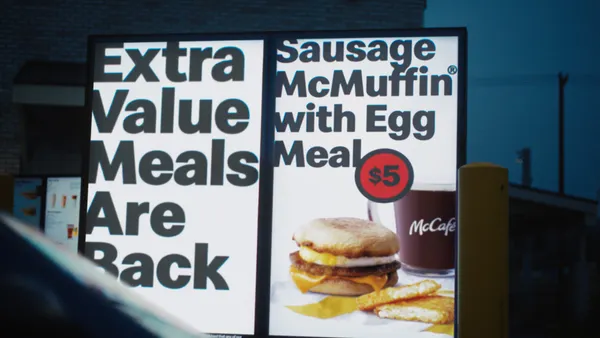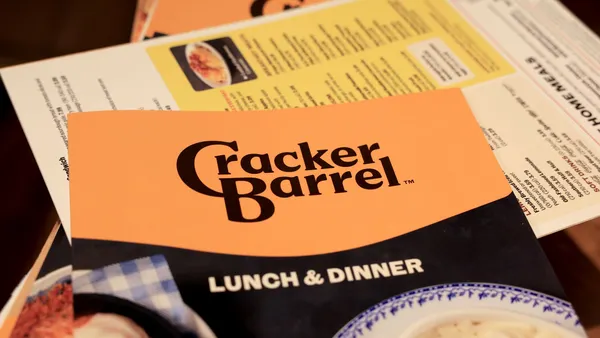Dive Brief:
- McDonald's is raising hourly wages by an average of 10% at its U.S. company-owned restaurants, impacting more than 36,500 employees, the chain announced Thursday. Ninety-five percent of the chain's U.S. footprint, which is operated by franchisees, will not be affected.
- The wage increases have already begun and will be rolled out over the next several months, bumping the entry-level hourly wage range for crew members to at least $11 to $17 and starting hourly range for shift managers to at least $15 to $20, depending on restaurant locations.
- The chain seeks to hire 10,000 employees for its U.S. company-owned locations over the next three months. These wage hikes could help attract and retain employees as the restaurant industry battles a labor shortage that spurred one McDonald's location to offer $50 to people who participate in a job interview. The move also follows employee plans to strike in 15 cities for higher wages the day before McDonald's annual shareholder meeting.
Dive Insight:
Though this wage boost could ease labor challenges at McDonald's corporate locations, its just a drop in the bucket when it comes to the mega chain's U.S. network. The pay increase does not affect employees at the roughly 13,000 McDonald's restaurants owned by franchisees, and this wage gap could fuel further employee discontent.
Mark Salebra, chair of the U.S. National Franchisee Leadership Alliance, said in a statement shared with Restaurant Dive that franchisees "are leading an effort to implement an enhanced Employee Value Proposition" that includes best practices on pay and benefits that operators "can implement however they deem appropriate to stay competitive in their local markets."
Because McDonald's is franchised, independent owner/operators are still responsible for setting pay rates based on local markets and store profit. And while the new pay gap between corporate and franchised locations could eventually shrink, it's unlikely that McDonald's will attempt to encourage its operators to make similar wage increases based on recent statements.
In response to the employee plans to strike for a $15 minimum wage, McDonald's said on Monday that "It's the responsibility of federal and local governments to set minimum wage, and we're open to dialogue so that any changes meet the needs of thousands of hardworking restaurant employees and the 2,000 McDonald's independent owner/operators who run small businesses."
Still, McDonald's said Thursday it expects the average hourly wage for its company-owned restaurants to increase to $15 an hour by 2024. Some restaurants have already reached an average hourly wage of $15 an hour this year, and more will reach that benchmark in 2021, according to the press release.
The impact of increasing wages will likely be minimal at the chain. CEO Chris Kempczinski previously said that it is doing "just fine" in the 29 states that have increased minimum wage beyond the federal level of $7.25. Higher wages didn't lead to closures, job loss or increased automation. Average hourly wages in general for nonsupervisory employees have also gone up industrywide, as well. As of March, average hourly earnings are estimated to be $14.57, an increase of nearly 5% from December, when hourly wages were $13.89, according to the the U.S. Bureau of Labor Statistics.
Rival chains have also pledged to raise pay to $15 an hour. More than 30% of Starbucks' U.S. employees already make $15 or more per hour as of December, and the chain has said it aims to pay its U.S. labor $15 or more per hour within the next two to three years. Chipotle also announced this week that it will raise wages to an average of $15 per hour by the end of June. Both of these restaurants, however, are entirely corporate-owned, which could threaten the hiring goals of McDonald's franchisees since pay will be consistent across locations compared to McDonald's operators' disparate compensation rates.












